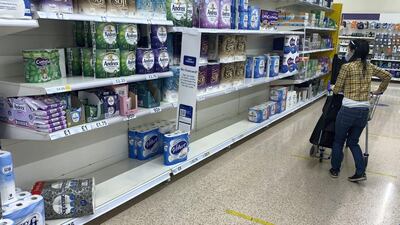British supermarkets said they are fully prepared to handle any surge in shopping on Monday, as signs of panic buying emerged around the country amid tightened coronavirus restrictions.
Leading grocery chains told The National they had plenty of capacity in store and online to meet a rise in demand that might result from Boris Johnson’s increased restrictions to combat the surging number of Covid-19 cases.
""I don't think we're going to be in the same situation that we saw in March," an Asda spokesman told The National. "With regards to delivery slots, we've increased them by about 65 per cent - from 450,000 to over 720,000 per week and we've still got all the measures in place that we had around the pandemic, such as store limits."
Panic buying at the height of the pandemic in March saw British shoppers strip supermarket shelves of grocery staples such as toilet paper, tinned food and soap. Supermarkets were forced to ration certain items and introduce specific times for key workers such as nurses and the elderly to do their shopping.
However, panic buying is on the rise again, according to UK media reports, with some stores reporting increasing demand for cleaning products and hand sanitisers.
Delivery slots for online orders are also being booked up in advance with online supermarket Ocado, emailing customers to warn of "exceptionally high demand" and "particularly large orders".
Twitter users have also ranted over a rise in panic buying.
“@Tesco @sainsburys and others why are you not limited the number of loo rolls, pasta etc that people buy. All you are doing is feeding the frenzy in #panicbuying the vulnerable are going to go without yet again and this time it’s all your fault!" wrote @bingocrazy.
Another Twitter user wrote “It’s Panic Buying season” while @WChris 78 said Just when you thought it was safe to go shopping..... The Panic Buyers are back!! #panicbuying #Covid19UK #COVIDIDIOTS #CovidUK"
Sainsbury's told The National that customers can continue "to shop with confidence in our stores, where they will see we have good availability".
“We can now serve twice as many people with home delivery and Click & Collect as we could six months ago and can reassure our customers there is good availability for slots,” the retailer said.
It added that National Health Service and care workers still have priority entry from 7:30am to 8am from Monday to Saturday and elderly, vulnerable and disabled customers receive priority entry from 8am to 9am on Monday, Wednesday and Friday.
Meanwhile, Tesco said it also has good availability in its stores and online and is not experiencing any shortages.
The retailer, which said in August it is creating 16,000 new permanent roles to support the exceptional growth in its online business, has more than doubled its online capacity from around 600,000 weekly slots at the start of the crisis to 1.5 million now.
Retail businesses have strengthened their supply chains since March, according to the British Retail Association, and invested hundreds of millions to make stores safe and secure for customers with new Perspex screens, social distancing measures and additional hygiene measures.
“Supply chains are stronger than ever before and we do not anticipate any issues in the availability of food or other goods under any future lockdown,” said Andrew Opie, director of food and sustainability at the BRC. “Nonetheless, we urge consumers to be considerate of others and shop as they normally would.”

On Tuesday, Prime Minister Boris Johnson said Britain is better prepared for a second wave of Covid-19 than it was for the first one. However, he slammed the brakes on the country’s return to offices and a normal social life as he said complacency about the risk of infection could be the country's undoing.
Mr Johnson unveiled a package of new restrictions, including requiring pubs, restaurants and other entertainment venues in England to close down at 10pm and urging employees to work from home where possible.
Britons now have to wear face-masks in taxis, something they already do in supermarkets and on public transport, the size of gatherings was curtailed and plans to bring spectators back to sports stadiums in October were put on hold.
“Businesses understand that further restrictions are necessary to tackle the rising number of coronavirus cases, but these measures will impact business and consumer confidence at a delicate time for the economy,” said Adam Marshall, director general of the British Chambers of Commerce, in response to the new measures.
"Businesses, their employees and customers need to see a clear road map for the existing restrictions and those that may be introduced in the future. This must include transparent trigger points, and clarity about the support available to protect jobs and livelihoods.”


